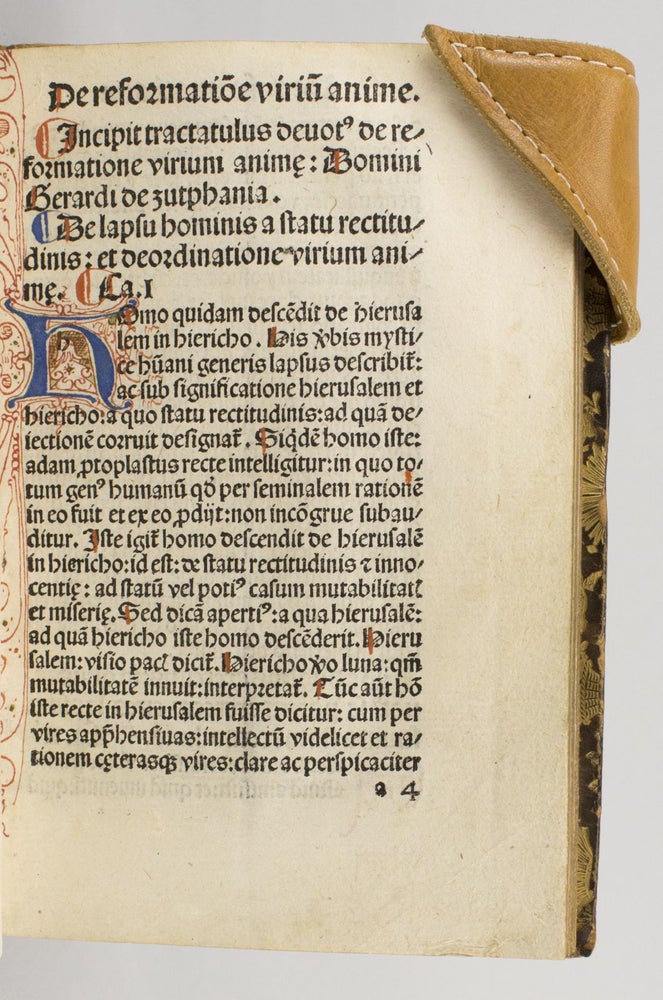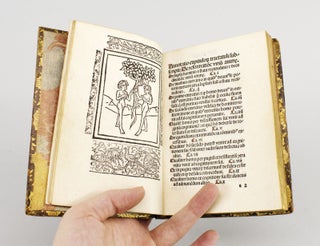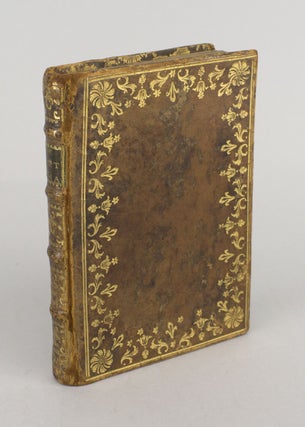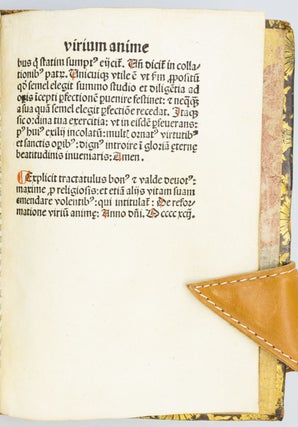DE REFORMATIONE VIRIUM ANIMAE.
([Basel: Johann Amerbach], 1492). 145 x 100 mm. (5 3/4 x 4"). Complete. [60] leaves. Single column, 27 lines of text (including headline) in gothic type. FIRST EDITION.
Pretty 18th century marbled calf, covers with double gilt-rule border enclosing frame of floral tools, raised bands, spine gilt in compartments with volute centerpiece and curling cornerpieces, black morocco label, marbled endpapers, all edges gilt. Woodcut frontispiece of Adam and Eve, one four-line maiblumen initial with marginal extension the length of the page, hand-painted red and blue paragraph marks and initials. Front pastedown with the bookplate of Bibliotheca Philosophica Hermetica; front free endpaper with 19th century bibliographical note; a few marginal annotations in ink. Goff G-171; BMC III, 755; ISTC ig00171000. ◆Joints and extremities a bit rubbed, boards tending to splay just slightly, but the binding solid and the gilt still glistening; one leaf with short repaired marginal tear, small (ink?) stains to a couple of margins, isolated corner creases, otherwise a fine copy, quite clean, fresh, and bright internally.
Beginning with a charming full-page woodcut of Adam and Eve in the garden partaking of the tree of knowledge, and featuring a prominent maiblumen initial, this is the first appearance of the inaugural treatise by Gerard Zerbolt of Zütphen, described by Post (in "The Modern Devotion") as "the most fertile and the most successful writer the Brothers [of the Common Life] ever produced." Zerbolt (1367-98) was an early member of the "Devotio Moderna" and served as librarian to the Brethren of the Common Life in Deventer. Despite his lack of university training, he "was remarkable for his absorption in the sacred sciences and his utter oblivion of all matters of merely earthly interest." (Cath. Ency.) Here, Zerbolt outlines how one can redeem the soul from its fallen state, moving to higher and higher levels through "self knowledge, repentance, combat of sin, mortification, the practice of humility and obedience." (Post) The "Devotio Moderna" helped pave the way for the religious reform movements of the 15th and 16th centuries, in particular with its emphasis on the importance of every person developing a personal relationship with God, as Zerbolt details here. According to Pollard, our printer Amerbach (1430-1513) issued his first book from a Basel establishment in 1478, and in his career printed about 100 incunabula, all in Latin and mostly works on theology or Bibles. He was the first printer in his city to use roman type. He also used several fonts that are nearly identical to those of Anton Koberger of Nuremberg, for whom he likely worked at some point in his career. Amerbach printed other works related to the "Devotio Moderna," including Thomas à Kempis' "Meditationes" and Zerbolt's "De Spiritualibus Ascensionibus," of which he presented 14 copies each to the Basel Charterhouse in 1488/89. This book rarely appears for sale and no incunabular edition has been seen at auction since 1975. (ST13006)
Price: $9,500.00




